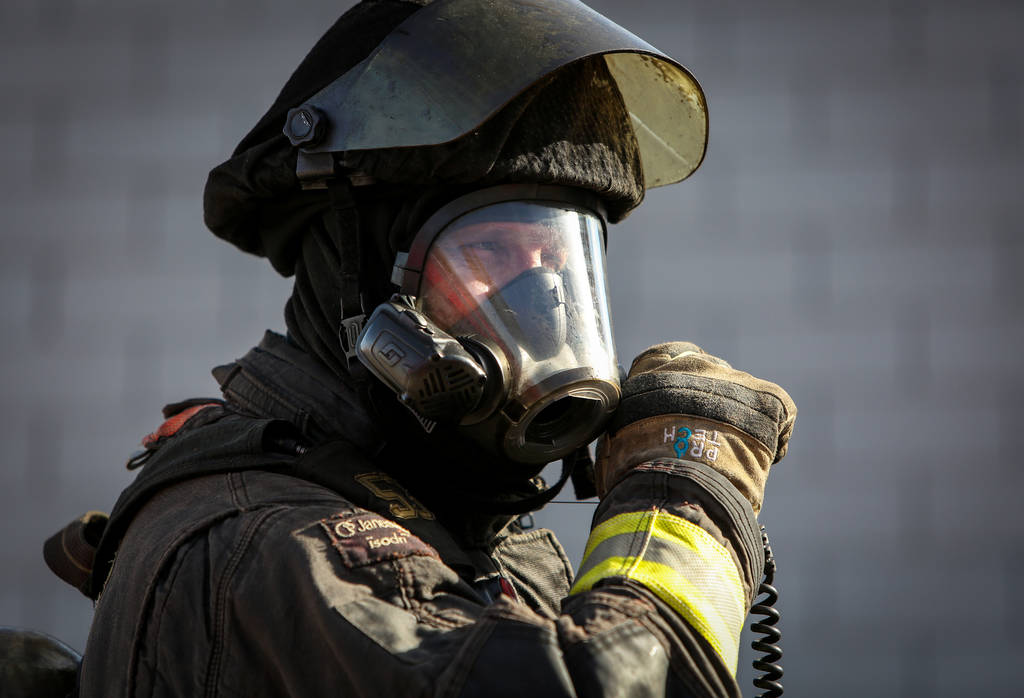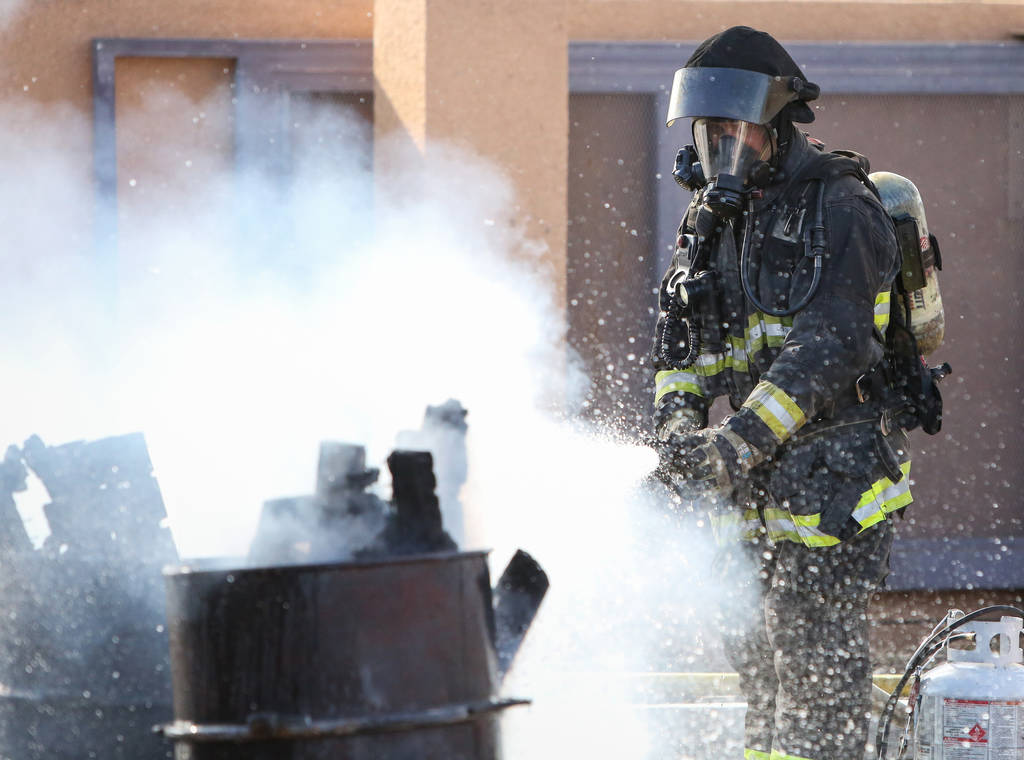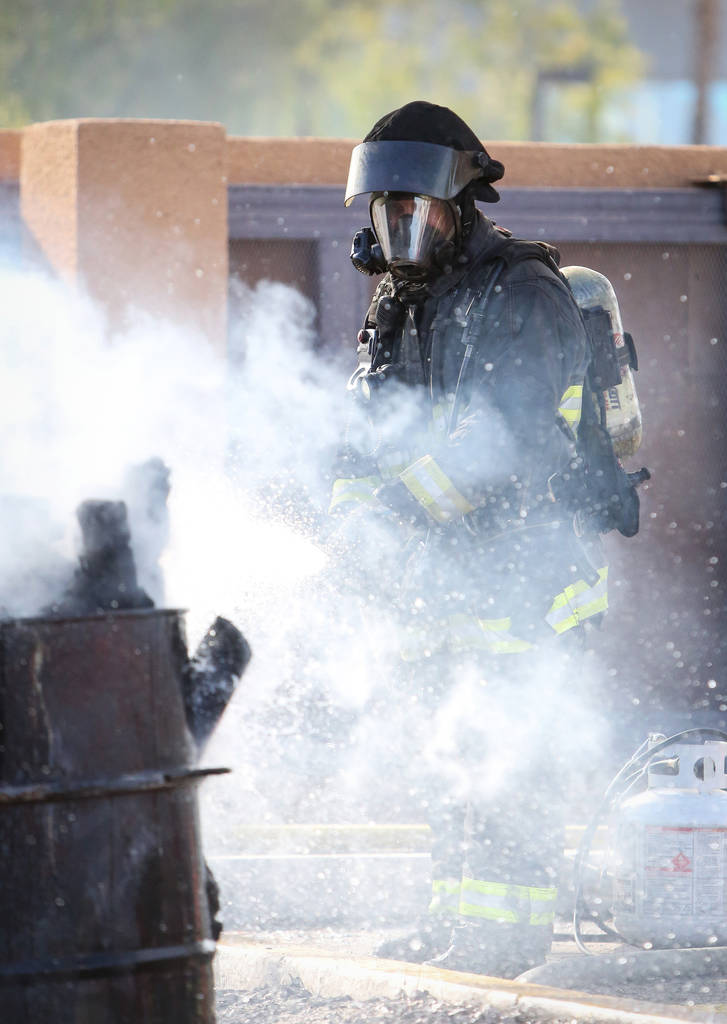Former Las Vegas hockey player now a career firefighter
Darcy Loewen is the nicest guy named “The Chainsaw” you’ll ever meet.
He’s a laid-back, easygoing sort, which is impressive at this moment because he’s just directed a group of North Las Vegas Fire Department trainees through an intense drill — one with smoke and real chainsaws — about entering a burning house through its roof.
Loewen makes it all look as easy as scoring on an empty net from point-blank range, and the analogy isn’t accidental: Before becoming a firefighter and recruit training officer, Loewen played pro hockey for 16 seasons, including five in the National Hockey League and four with the long-gone but fondly remembered Las Vegas Thunder.
The Thunder’s short but memorable run helped make Las Vegas a hockey town long before the arrival of the NHL’s Vegas Golden Knights. And when the Thunder was inducted into the Southern Nevada Sports Hall of Fame, Loewen was name-checked in the citation.
Up through the ranks
Loewen, 49, grew up in Alberta, Canada, and embraced ice hockey early. “I was on skates at the age of 4 or 5,” he says. “I was instantly hooked. What captivated my attention to hockey was the speed of it, the aggressiveness of it, the intensity of it, which all made it fun for me.”
Loewen describes his family as blue-collar and grassroots. “I come from a family of farmers, and my father owned a Shell station, so I did my fair share of pumping gas and throwing hay bales,” he says, learning early on “the value of a strong work ethic and the value of a good, honest hard day’s work. That’s something I carried over throughout my lifetime.”
Loewen spent years working himself up through hockey’s ranks. He played with the Spokane Chiefs of the Western Hockey League, and in 1988 was drafted by the NHL’s Buffalo Sabres. He played for three years with the Sabres and their Rochester, N.Y., affiliate.
When the Ottawa Senators came into the NHL, the team picked up Loewen in the expansion draft, and he played with the Senators for two years. What was it like to see his childhood dreams finally realized?
There’s “no way to describe it,” he says. “It’s a feeling of knowing you’ve put your mind to something and, because you put in the time and effort to see your dreams come to fruition, it’s very gratifying. It’s something that nobody could ever take away from you.”
Welcome to Las Vegas
A house-cleaning by new management brought Loewen to Las Vegas and the International Hockey League’s Las Vegas Thunder during the team’s second season in 1994-95. The IHL wasn’t the NHL, but Loewen found a major-league atmosphere here.
“Coming to Vegas and stepping out onto the ice for the first time at Thomas & Mack, my first thought was, ‘This is legit.’ There were 13,000 people in the stands, and a year prior they had a very successful season. “I thought, ‘I think hockey could work in this city.’ “
Not that Las Vegas wasn’t an adjustment for Loewen. “I grew up always being used to the change of seasons and snow on the ground during hockey season,” he says, so Las Vegas was “a little surreal. It was still October or November and still 70 or 80 degrees outside and no snow on the ground.”
He laughs. “I’ve been here a long time and I still have not been able to adjust to the heat in the summer. I’m miserable in June, July, August to the end of September.”
Popularity and transition
Loewen became a fan favorite during his four seasons here. “I don’t know,” he says, shrugging off the description. “All I wanted to do was just go play hockey as hard as I could.”
So when the Thunder traded him in 1998 to the Utah Grizzlies in a salary-management move, neither he nor fans were thrilled.
Being traded was “a little disheartening at first,” Loewen says. “But I was going to a good franchise in Salt Lake City and I knew quite a few other payers playing for the Utah Grizzlies at that time.”
He played for the Grizzlies for one season, went to England to play for the Nottingham Panthers for another — his daughter was born there — and played with the Idaho Steelheads as player-coach for two seasons. In 2001, he decided to hang up his skates.
Loewen and his wife, Julie, were married in 1997 and by then had a newborn son and a 2-year-old daughter. Loewen felt the need for a change. “I was only 32 when I got out of the game, but my body felt much older than that.
“It was the hardest thing I’ve ever had to do in my life, to get to that point in time where you have to give up your passion and move on to something else.”
From ice to fire
Loewen had talked with other hockey players who went into firefighting after their hockey careers had ended. Among them was Ken Quinney, a Clark County firefighter who also had played in the NHL and who was his Thunder teammate.
Loewen also liked Southern Nevada. “Timing is everything,” he says. “I met my wife here, and her family lives here, so it all kind of worked out.”
Loewen joined the North Las Vegas department in 2007, and he’s found that hockey and firefighting have similar dynamics: Working as a team and watching colleagues’ backs, having a strong worth ethic, practicing protocols and implementing them. He found that firefighting also is suited for aggressive, take-charge people who perform well under intense pressure.
That nickname
“The Chainsaw?” Loewen smiles.
“I got that nickname when I played in Ottawa. Before the season started, the coaching staff sat down with the media and they were asking questions about ‘Who’s that guy? How about this guy?” One reporter asked, ‘Darcy Loewen, what’s his story?’ And our assistant coach at the time, E.J. McGuire, said, ‘Well, that’s The Chainsaw.’ ”
“It was funny,” Loewen says. “If I scored a goal or got put in the penalty box, they’d put a chainsaw (sound) over the loudspeakers.”
He figures the nickname alluded to “my work ethic and determination on the ice. I never took a shift off. I made sure I left it all on the ice, every shift, every game, my entire career.”
In 2018, the Thunder was inducted into the Southern Nevada Sports Hall of Fame, which traced to the club “the roots of professional hockey in Las Vegas” and “paved the way for the future success of professional hockey in Las Vegas.”
Loewen — one of the Thunder players named in the hall’s citation — is grateful for the honor. Not surprisingly, he’s a fan of the Vegas Golden Knights and made it to a few games last season.
“I love to watch the flow of the game back and forth, the scoring, just asking myself, ‘If I were in that position, would I have done that?’ ” he says. “I don’t think that’s ever going away. I’ll miss the game until the day I die.
“Mind you, I don’t miss the travel, I don’t miss the injuries and body aches. But I definitely miss being on the ice, playing.”
Contact John Przybys at jprzybys@reviewjournal.com or 702-383-0280. Follow @JJPrzybys on Twitter.




































